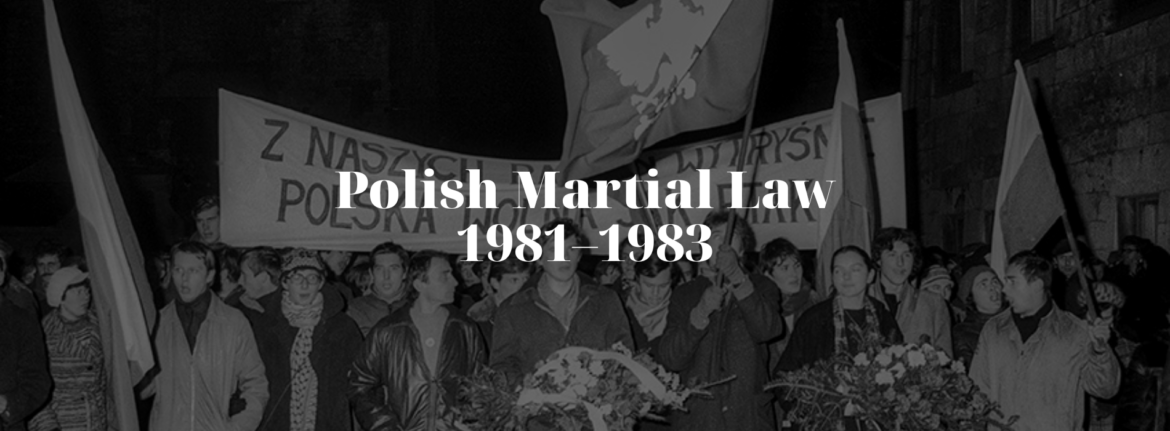The imposition of martial law in Poland on 13 December 1981 marked one of the darkest chapters in the country’s modern history. Introduced by General Wojciech Jaruzelski and the communist authorities, it was a desperate attempt to suppress the growing opposition spearheaded by the Solidarity movement (Solidarność). This dramatic period of oppression left a profound impact on Polish society, shaping the nation’s path toward eventual liberation from communist rule.
Prelude to Martial Law: The Rise of Solidarity
The roots of martial law lay in the political and economic crises that plagued communist Poland throughout the late 1970s and early 1980s. Mounting dissatisfaction with the regime was fuelled by shortages of basic goods, declining living standards, and widespread corruption. Amidst this turmoil, the Solidarity movement emerged in August 1980 as a powerful voice of opposition.
Founded by shipyard worker Lech Wałęsa in Gdańsk, Solidarity was the first independent trade union in the communist bloc. It quickly transformed into a mass social movement, rallying millions of Poles who sought greater political freedoms and improved working conditions. The rapid growth of Solidarity alarmed the Polish United Workers’ Party (Polska Zjednoczona Partia Robotnicza), which feared losing its grip on power.
Under pressure from the Soviet Union to curb dissent, the Polish leadership, led by General Jaruzelski, opted for a drastic solution. Martial law was declared to crush opposition and restore control, with officials justifying the move as necessary to prevent a Soviet military intervention. Many Poles, however, saw it as a betrayal and an act of war against the nation.
The Night of 13 December 1981: The Clampdown Begins
In the early hours of 13 December 1981, Poland awoke to a grim new reality. Tanks rolled into cities, and soldiers patrolled the streets. The communist regime cut off telephone lines, imposed curfews, and banned public gatherings. Airports were closed, and borders sealed, effectively isolating the country from the outside world.
The authorities targeted Solidarity leaders and activists in a sweeping crackdown. Thousands were arrested and detained in internment camps, including Lech Wałęsa. The movement’s offices were raided, and its activities declared illegal. The imposition of martial law effectively turned Poland into a police state, where fear and repression reigned.
Life Under Martial Law: Hardship and Resistance
Martial law brought significant hardship to the Polish people. Daily life was characterised by strict curfews, surveillance, and censorship. Military presence in the streets served as a constant reminder of the regime’s iron grip. Shortages of food and fuel worsened, with queues stretching for hours as people scrambled to secure basic necessities.
Despite these challenges, the Polish people did not submit passively. Acts of resistance emerged across the country, ranging from strikes and demonstrations to underground publishing and radio broadcasts. Many risked their lives to distribute banned literature or organise protests. The Church, led by figures like Pope John Paul II, provided moral support and served as a sanctuary for those resisting oppression.
One of the most tragic incidents during this period occurred on 16 December 1981, when militia forces opened fire on striking miners at the Wujek Coal Mine in Katowice, killing nine workers and injuring many others. This brutal suppression became a symbol of the regime’s disregard for human life and further galvanised opposition to communist rule.
Legal and Moral Outrage: Was Martial Law Justified?
The declaration of martial law has been widely condemned as both unlawful and immoral. Even within the framework of the communist legal system, the move violated constitutional procedures. The State Council, which enacted the decree, lacked the authority to impose martial law without the Sejm’s (Polish parliament) approval.
General Jaruzelski and his supporters argued that martial law was a necessary evil to prevent an even greater catastrophe, namely a potential Soviet invasion akin to those in Hungary (1956) and Czechoslovakia (1968). However, many historians and legal experts dispute this claim, noting a lack of concrete evidence that the USSR was poised to intervene militarily.
In the years following Poland’s transition to democracy, martial law has remained a contentious issue. While some view Jaruzelski’s actions as pragmatic under the circumstances, most Poles regard the period as a grave injustice and a betrayal of national aspirations for freedom.
The Road to Freedom: Solidarity’s Triumph
Martial law officially ended on 22 July 1983, though its effects lingered for years. By suppressing opposition, the regime temporarily restored a semblance of stability, but it could not extinguish the desire for freedom. Solidarity went underground, continuing its resistance in secret and gradually rebuilding its strength.
The tide began to turn in the late 1980s as economic decline and growing discontent weakened the communist regime. In 1989, following a wave of strikes and negotiations between the government and opposition, Poland held its first semi-free elections. Solidarity won a decisive victory, paving the way for the end of communist rule and the establishment of a democratic government.
Legacy of Martial Law: A Nation’s Resilience
The imposition of martial law remains a defining moment in Polish history. It symbolises both the extent of the regime’s oppression and the resilience of the Polish people in their fight for freedom. The sacrifices made during this dark period are remembered every year on 13 December, when commemorations honour the victims and celebrate the triumph of democracy over tyranny.
For many Poles, martial law serves as a stark reminder of the fragility of freedom and the importance of defending it against all odds. Through the courage and determination of its citizens, Poland emerged from this ordeal stronger and more united, ultimately achieving the independence and democracy for which so many had fought and suffered.
